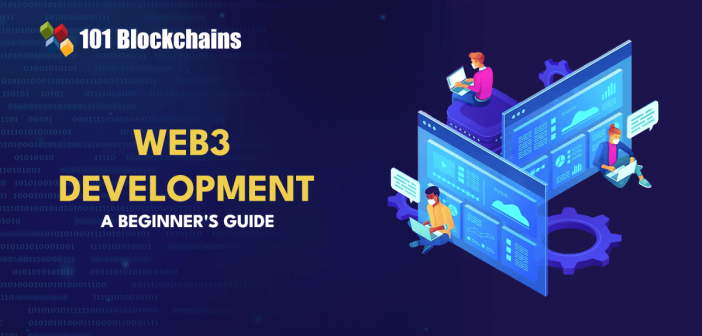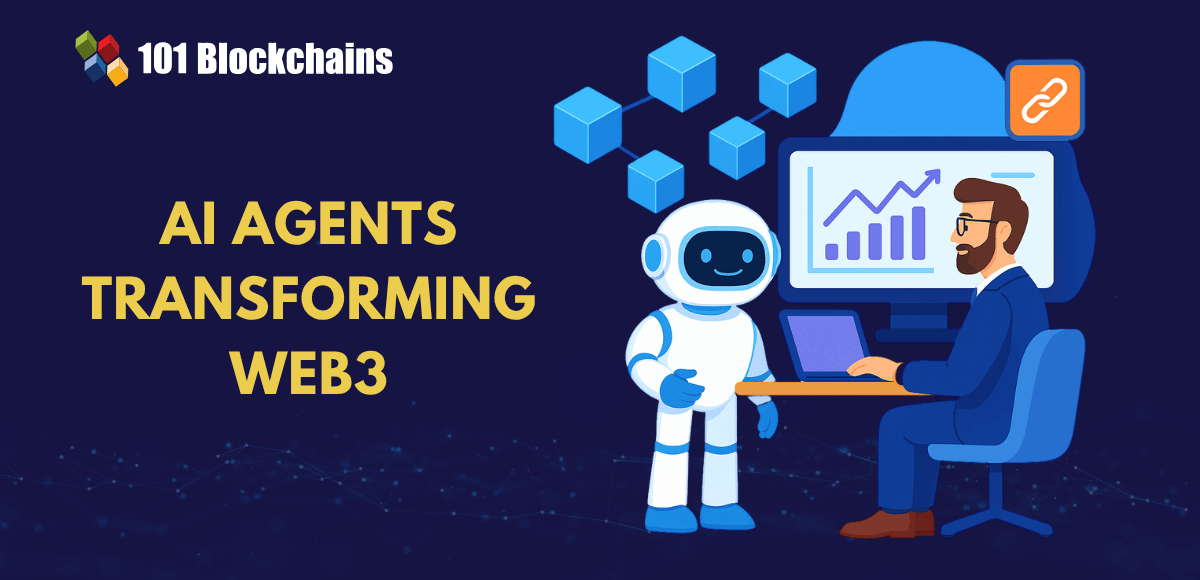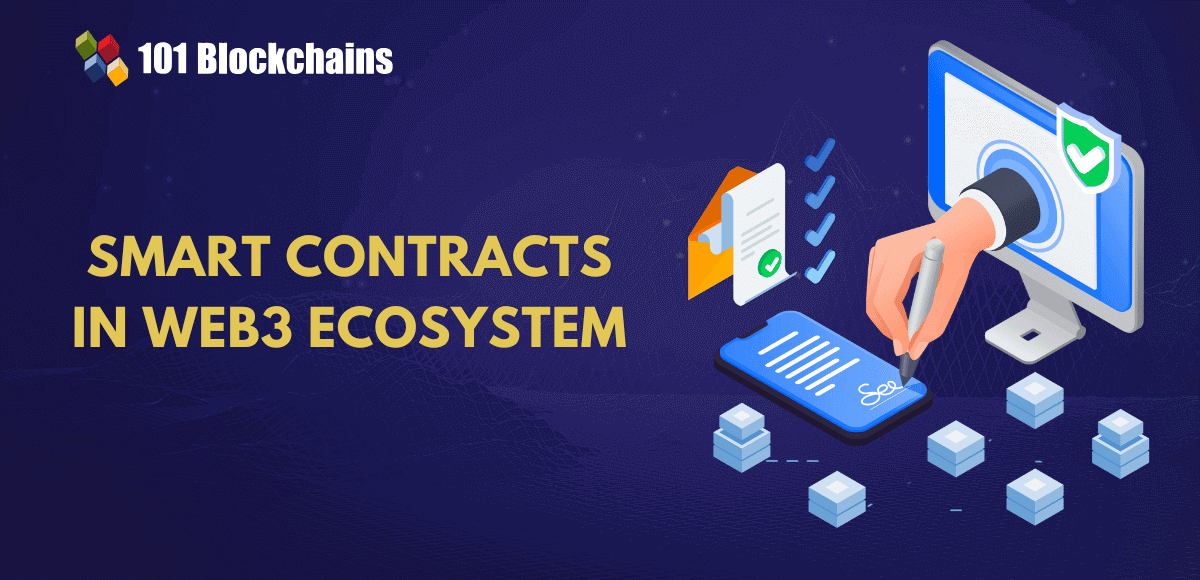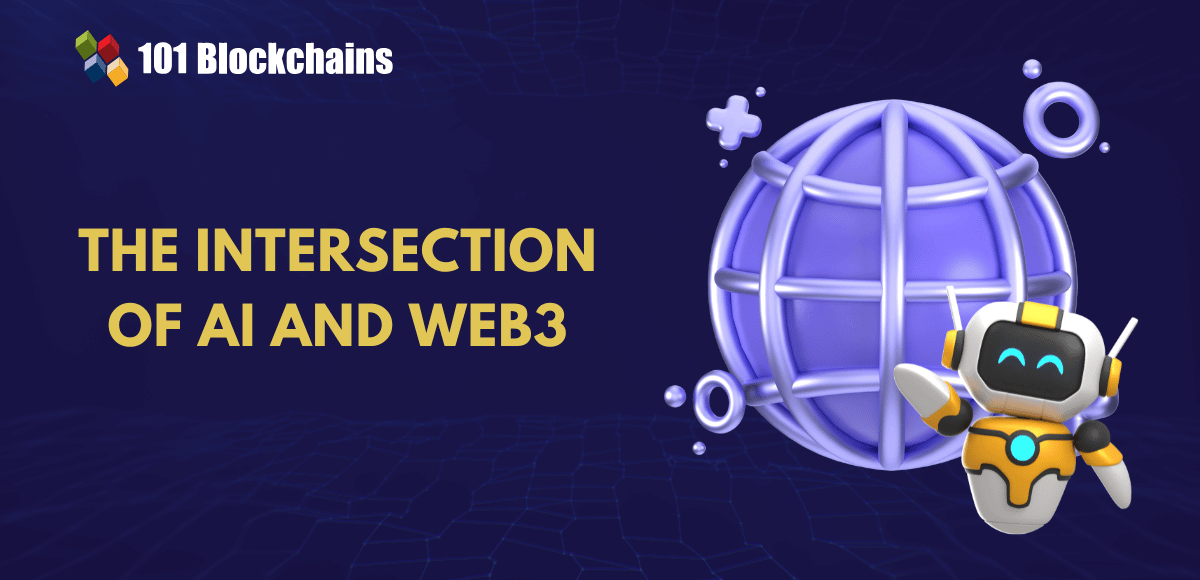Learn how blockchain truly works, master key definitions, and uncover what makes smart contracts so "smart." Dive into the fundamentals, gain valuable insights, and start your blockchain journey today!

- Web3
Georgia Weston
- on March 28, 2024
Web3 Development 101: Understanding the Basics of the Decentralized Web
The consistent evolution of the internet has been a major highlight in the world of technology. There was a time when the internet served only as a repository of information. Now, the mainstream uses of internet allow people to connect with each other and share their experiences in different ways. Web3 has emerged as the latest variant of the internet, which has not materialized completely yet. You are here looking for a web3 development guide as you must have come across the term ‘web3’. It is also important to understand the impact of web3 on the modern labor markets.
Web3 development has emerged as a formidable trend with the growing demand for dApps, NFTs, and metaverse solutions. Let us learn more about the fundamentals of the decentralized web and important tools that are required for web3 development.
How Did the Internet Evolve?
The best way to begin a web3 development roadmap involves understanding how the concept of a decentralized web came into existence. In the initial stage of Web 1.0, the internet provided limited information, and there was almost zero user interaction. The next stage of the Internet, or Web 2.0, introduced major developments in web technologies, including JavaScript, CSS3, and HTML5.
With Web 2.0, e-commerce and social media gained momentum, making the Internet more interactive. Web3 or Web 3.0 is the next stage in the evolution of internet. It empowers users with control over their data and virtual assets. It also marks another major evolution in the user experiences on the internet. Web3 offers assurance of ubiquity and three-dimensional immersive spaces.
Another important aspect you must discover before you learn web3 development is the type of technologies that define web3 landscape. In Web 1.0, the internet was only a collection of web pages that displayed static information. Web 2.0 introduced the scope for creating user-generated content and enabled data sharing.
Web2 also opened the roads for conducting financial transactions that encouraged the rise of e-commerce. While web2 relied prominently on web technologies, web3 brings a completely new assortment of technologies. Web3 utilizes AI technology, blockchain, machine learning, deep learning, natural language processing, and IoT to create a decentralized web.
Curious to develop an in-depth understanding of web3 application architecture? Enroll now in the Web3 Application Development Course
Notable Traits of Web 3.0
The next crucial highlight of web3 that can help you understand the fundamentals of the decentralized web is the outline of distinct specializing traits. You can explore answers to ‘how to start web3 development?’ with a better perspective by learning about the properties of web3. The transition to web3 is happening gradually and remains unnoticed by the mainstream audience.
Web3 apps have the same aesthetics and look as web2 applications, albeit with fundamental differences in the backend design. The future of web3 focuses on creation of universal applications. Anyone can read and use such applications across different types of devices and software versions. It would ensure better accessibility and convenience in accessing the internet for leisure as well as business.
The distinctive traits of web3 development platforms also invite attention to the possibilities for using blockchain storage and distributed ledgers. It can help the decentralized web overcome the challenges associated with centralized web2, such as unauthorized surveillance and invasive advertising. With the decentralized web, users would have complete control over their data. Here is an outline of the most prominent traits of web3 you must learn before beginning web3 development projects.
-
Semantic Web
The most distinctive highlight of web3 is the semantic web. Semantic web is a concept conceived by Tim Berners-Lee, the architect of the internet we use today. The term ‘semantic web’ describes a collection of data that can be subject to machine analysis. Semantic web would have a major role in fuelling the demand for web3 development tools as it would introduce new advancements in user experiences. Semantics refers to the emotion or meaning in a statement that considers the context in which the statement is used.
Web3 has two major pillars: semantic web and artificial intelligence. With semantic web, web3 can teach the exact meaning of data to the machines. On the other hand, AI can also help in developing real-world use cases to leverage the optimal potential of data. The primary concept for creating a semantic web revolves around developing a spider web of knowledge across the internet.
It would help in developing a better understanding of the meaning of words. At the same time, it also ensures creation, sharing, and connection of content by utilizing search and analysis functions. Web3 can also guarantee improved data communication with the help of semantic metadata. Therefore, user experience would feature a different level of connectivity that leverages all the accessible data.
Learn the fundamentals, challenges and use cases of Web3.0 blockchain from Web 3.0 E-Book
-
Artificial Intelligence
Websites can use artificial intelligence to filter and deliver the desired information to users. The importance of artificial intelligence in a web3 development guide for beginners revolves around the limitations of web2. For example, businesses in web2 landscape collect customer feedback to develop a better understanding of customer behavior.
It is important to note that customer feedback has emerged as one of the prominent tools for empowering consumers in the modern business landscape. For example, customer reviews on Amazon and other e-commerce sites can help customers make the right choice when purchasing a product or service.
While peer reviews are a prominent reason for the effectiveness of web2, they also present a significant concern. For example, human recommendations are not completely incorruptible. Let us assume that a group of people with an agenda to blast negative reviews for a product give their reviews for a new product. It can lead to confusion for buyers, who could end up choosing other products. Artificial intelligence can play a vital role in differentiating good data from bad data to offer dependable information.
Artificial intelligence and machine learning are important highlights in web3 as they help in empowering the semantic web. Web3 can utilize AI and NLP technologies to empower machines to understand information in a way similar to humans. Machine learning is a common term you would come across when you learn web3 development, as ML algorithms replicate human learning. As a result, AI would not only offer opportunities for targeted advertisements but also ensure that users get faster and more relevant outcomes for their queries.
-
Ubiquity
Another prominent trait in the definitions of web3 is ubiquity. Ubiquitous internet is one which you can find simultaneously across multiple places. You might wonder about the ways in which web2 enables ubiquity through social media. For example, you can click pictures with your phone and post them on Instagram, from where the pictures become the intellectual property of Instagram. Once you have posted your image on the social media platform, it will become ubiquitous or available from any location.
Anyone interested in finding answers to “How to start web3 development?” should pay attention to the ubiquitous nature of web3. Your desktop computer, laptops, and smartphones would no longer be the only devices that can help you access the internet. How will it be possible? The web3 would mark the rise of an all-powerful internet with almost everything around you connected to the internet.
For example, Internet of Things can ensure that your home appliances, vehicles, and security systems are all connected to the Internet. Interestingly, all the internet-connected things around you would offer a comprehensive internet experience rather than just sending and receiving data from the internet.
Build your identity as a certified blockchain expert with 101 Blockchains’ Blockchain Certifications designed to provide enhanced career prospects.
-
Immersive and Engaging 3D Experiences
The next noticeable highlight of web3 is the facility for immersive and engaging three-dimensional experiences. Web3 has the potential to transform the internet into a realistic 3D virtual space from a two-dimensional collection of web pages. Web3 websites and apps, including e-commerce solutions, virtual real estate, and online games, utilize three-dimensional immersive spaces for enhancing user engagement.
Most of the discussions about web3 development platforms draw attention towards metaverse platforms. Within the metaverse, users can explore the internet as a three-dimensional space. In addition, web3 games have also come up with unique storylines that provide an engaging experience to all users.
-
Decentralization
The list of unique traits of web3 also draws attention to the element of decentralization, which is a fundamental element in web3. In the existing version of the Internet or web2, machines have to look for data in a centralized location, such as a single server.
However, a review of Web3 development tools will help you discover that Web3 stores data in different locations, thereby facilitating decentralization. Therefore, machines can search for data on the basis of its content rather than relying on a specific location. It would help empower users with more control and break down the monopoly of tech giants such as Google on data ownership.
Decentralization in web3, driven by blockchain technology, can also help users sell their own data by leveraging decentralized data networks. It helps in ensuring that users can maintain complete control over ownership of their data. Powerful and comprehensive computing resources would play a crucial role in production of data, which remains under the control of centralized authorities in web2. Decentralization also provides the foundation for trustless interactions on web3, as users do not have to rely on trusted intermediaries.
How Will Web3 Help Users?
The most important doubt regarding web3 on your minds right now must be about its benefits for users. One of the first things in a web3 development guide is the outline of advantages offered by web3. It is important to note that most of the advantages of web3 emerge from its unique decentralized structure. The decentralization shifts the control over the internet to the users.
You can notice the impact of such a transition by reflecting on the requirements for internet users in Web 2. For example, web2 users can log in to social networks to access, share, and interact with different types of content. In this case, the social media platform has ultimate control over deciding who can join the network and how they can interact with others.
The platform can remove or limit users in terms of what they can do on the platform. On the other hand, web3 entrusts the community with this responsibility. The community of the social media platform would take charge of self-governance of the content alongside the people who share the content. Web3 or the decentralized web can offer the following advantages to overcome the pitfalls existing in web2.
First of all, users would have better opportunities to interact with content, and other users would experience better user experiences with higher engagement.
Web3 users are not only content consumers but also content owners. On top of it, users also become contributors or owners of the community and receive incentives for participating in web3 platforms. As a result, users would not have to trade their personal data to access digital services.
Another important aspect of web3 fundamentals that can help you learn web3 development with better clarity is the use of permissions and privacy. All the network users on web3 would have complete access to the data of a network and the relevant permissions for using the service. On top of that, users can also have complete control over their privacy by maintaining a secret identity.
Build your fluency in Web3 and develop decentralized solutions with the world’s first Web3 Expert Career Path with quality resources tailored by industry experts Now!
What are the Tools for Web3 Development?
The discussions about web3 development would remain incomplete without referring to the tech stack for developing web3 apps. You can begin your journey in web3 development by understanding and working with different components in the web3 tech stack. Some of the most notable components in the web3 development tech stack include blockchain, smart contracts, file storage, and development environments. In addition, you must familiarize yourself with testing frameworks, UI/UX components, and user identity management.
Final Words
The review of the fundamentals of web3 shows that you can build web3 solutions only with proficiency in blockchain technology. You must also be fluent in utilizing web3 development tools such as smart contracts. Most importantly, you must have an in-depth understanding of how the decentralized web works and how it helps users. Learn more about blockchain technology and the role it plays in creating web3 solutions to become a web3 expert right away.







